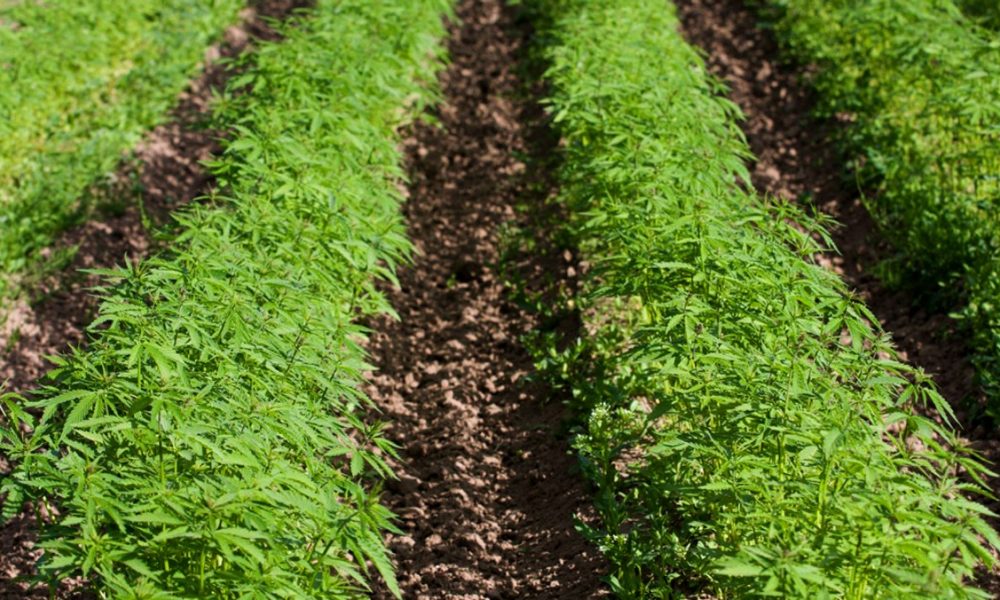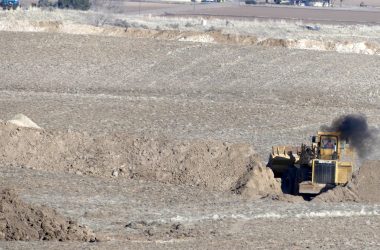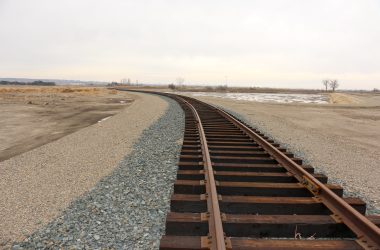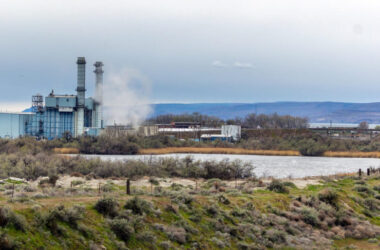 Hemp is a hybrid cousin to marijuana but with trace amounts (less than 0.3 percent) of THC, the psychoactive ingredient that gets people high. (Photo contributed by Jim Hutchens)
Hemp is a hybrid cousin to marijuana but with trace amounts (less than 0.3 percent) of THC, the psychoactive ingredient that gets people high. (Photo contributed by Jim Hutchens)
ONTARIO – Jim Hutchens is betting $2 million that growing and processing hemp has a strong future in Malheur County.
The former military pilot is growing hemp and now plans to open an extraction factory at what was once the Ontario Golf Course.
The goal at Treasure Valley Extractions: extract a natural organic oil containing the chemical known as cannabidiol, or CBD oil.
The oil, which exists in both hemp and marijuana, is used as an over-the-counter medicine for treating everything from epilepsy to arthritic pain, and its surging popularity is the reason Hutchens and other residents are getting into hemp.
Hemp is a hybrid cousin to marijuana but with only trace amounts of THC, the psychoactive ingredient that gets people high.
Growing hemp is legal under federal law, and the plant has been used over the centuries for cloth, high-strength fibers, food, seed and fuel.
Hutchens is among 547 hemp growers registered with the Oregon Department of Agriculture. He started growing his own last year, and now has an estimated 6,000 plants.
Last month, his company entered a 20-year lease for the golf course property in a deal approved by the Ontario City Council. Hutchens said CBD extraction will begin the first week of October in the clubhouse with machinery that Hutchens said cost his company $400,000.
He said Treasure Valley Extractions will employ up to 25 people.
The facility will be capable of processing 1,500 pounds of hemp per day. It’s extraction process aims for purity in the product.
“We employ a team of specialists led by a top research and development manager with over 10 years experience in the industry,” Hutchens said.
In its purified form, CBD oil can cost $20 to $100 per gram.
He said future plans for the surrounding 10 acres of the former golf course include greenhouses to cultivate hemp seed. He now operates a seed facility in Portland.
Hutchens said he hopes to jumpstart local hemp farming and provide a supply for his operation. Because of the high demand and low supply of quality CBD-rich oil, which studies indicate has medicinal properties, Hutchens said farmers currently can make $50,000 to $60,000 an acre growing hemp. There’s no way to predict future pricing, he said, but the outlook for his crop is strong for 2019.
He said he is exploring models that would provide qualified farmers free seed to get started. He said a pound of seed can sell up to $20,000 depending on the quality.
Growing interest in hemp
Hutchens began looking into the marijuana industry a few years ago.
“We actually were considering doing indoor marijuana grow, but expenses for doing that in Oregon made me change my mind,” said Hutchens.
He said he recognized that state was careening toward a marijuana glut. Across the state, marijuana production has skyrocketed as demand has remained steady, causing weed prices to go into freefall.
Hutchens said he switched his interest to hemp based on the economic outlook for marijuana in Oregon and the positive aspects of CBD oil. He has stepped away from marijuana seeds and growing.
Hemp-based CBD oil contains no THC, the chemical that produces the “high” from marijuana, and is regulated as a crop by the Department of Agriculture.
Robert and Eileen Mairs of Circle M Farms started growing hemp industrially this year on their ranch in northern Ontario, where they also raise grass-fed cattle. They have about 40 acres of hemp, which they plan to harvest in two to three weeks.
The Mairs are growing hemp for CBD oil, which they plan to process in Bend and Culver.
“It may or may not be profitable,” said Eileen Mairs. She said her family got interested in growing hemp when they learned about CBD oil’s “medicinal uses and healing properties.”
With Treasure Valley Extractions moving in at the golf course, Hutchens said his hemp operation has been attracting interest from area farmers.
“We’ve got about a dozen farmers lined up who have expressed interest in doing business with me,” said Hutchens. “We’ve had some incredible interest in it. Farmers are coming knocking at our door. There’s a huge demand and huge shortage.”
Hutchens said he has “managed to get $2 million to put the hemp operation together” through his close friends and “some local investors” he declined to identify.
Barriers to grow
Farmers like Hutchens and Mairs say that conditions make eastern Oregon an ideal place to grow hemp for CBD oil.
“Yes, it’s a good place,” said Clinton Shock, a horticulturist at Scientific Ecological Services in Ontario. “However, not every field is a good place.”
Hemp grows well in soils with more salt and alkaline properties. Shock said that the same kinds of soil used for growing onions and potatoes would be good fields for growing hemp. Meanwhile, “fields that would only be used for sugar canes, alfalfa or barley” don’t have ideal conditions for hemp, he said.
The availability of suitable land to grow hemp isn’t the biggest issue, said Shock.
“There’s a lot of labor involved,” said Shock. “There are lots of things you need to learn for growing hemp. It’s not necessarily a good idea to grow a crop if you don’t understand it.”
One hurdle is the lack of approved pesticides and insecticides for hemp farming.
“Everything has to be done organically,” he said.
Farmers also would find it difficult “keeping plants from having male flowers,” said Shock.
Hemp is a dioecious plant – flowers are either male or female. CBD is abundant in unpollinated female hemp flowers. Meanwhile, males produce no flower – the source of the oil.
“You need to cross a female to a female to make a female,” said Shock. “You try not to get hermaphrodites or males, which are both common.”
Hence, the trick is only to have female plants grow. The same goes for breeding hemp seeds.
“I think there are some real problems in terms of just starting to grow the crop. All sorts of problems can occur that a new grower might not be prepared to deal with,” said Shock. “I think there’s a real shortage of information and understanding. It could be really dangerous for putting lots of investment in growing the crop and not have the right seeds or agricultural practices.”
The cost of seed alone can turn away farmers from hemp.
Hutchens said that costly pound of seed covers only 20 acres of land.
“That could be a serious barrier to entry,” he said.
Farmers who grow hemp would also need to make sure they have a buyer before planting. In Malheur County, there are nine licensed growers, but only three licensed processors.
There are still a lot of things that can be accomplished with hemp plants besides CBD oil, Hutchens said.
“Industrial hemp is being used for 25,000 products,” he said.
Hutchens said he has another idea – feeding hemp to cattle. He sees that as an extension of the already developing market for CBD pet supplements and products.

Reporter Kristine de Leon: [email protected] or (510) 225-8231




